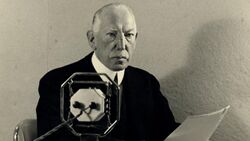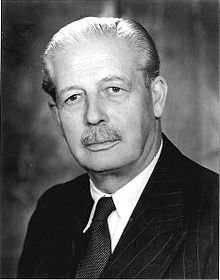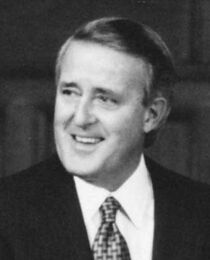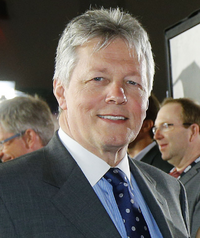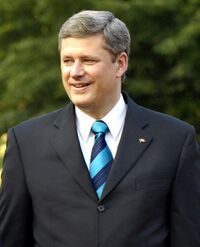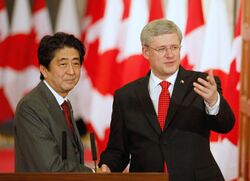The National Union Party abbreviated to NUP and colloquially known as the Tories is a conservative Rainian political party. Founded out of a merger between the Conservative Party and Liberal Party, it generally follows centre right policies.
The NUP was founded in 1933 following the General Strike, Prime Minister Edmund Chester Osborne oversaw the merging of the Conservative and Union parties to create an anti-socialist coalition. The NUP currently are the third largest opposition party the House of Councillors and the second largest party in the House of Senators.
History
Formation
The National Union Party were officially formed in 1934 as a merger of the National and Union parties. The Nationals were conservative and staunchly supportive of links with the UK with their support coming from rural areas whilst the Unionists were liberals with support from urban areas.
The Union and National Parties had traditionally opposed each other in a two-party system dating back to the earliest days of federation. However several factors led to their merger - the first was the move towards a additional members system under the premiership of A. A. Duncan. This meant that the first AMS government, that of Joseph Lear from 1926-1929 relied on support of other political parties to retain power, with Lear engaging in limited cooperation with the Union party. The move to AMS led to the rise of the social democratic Labour Party which challenged the progressive hegemony the Unionists had retained since federation.
The impetus for a merger came during the Great Depression. The Union government of Rhys Lawgoch had responded to the depression with fiscal conservatism cutting expenditure, raising tariffs, bringing back the gold standard and ordering business to lower wages which led to higher unemployment. In 1932 the Amalgamated Confederation of Trade Unions announced a general strike over a shipbuilders dispute with the Lawgoch government taking a hardline against the ACTU with the Union party splitting over the issue resulting in the fall of the government.
The 1933 election saw the National party under Albert W. Moore become the largest party with the Labour party coming second, the Union party third and Social Credit party fourth. The Nationals did not have a majority and Lawgoch delayed the opening of parliament to strike a coalition deal between right wing Unionists and the Nationals. Moore agreed to the proposal and the two parties formed a government with Lawgoch as Prime Minister.
In 1934, the fear of a united socialist party in the form of the Labour party led the National and demoralised Union parties to merge into a "National-Union Party". The party was mainly dominated by former National party members as the Union party saw it left and centre wings join other parties.
The party in its early years was ideologically heterogeneous, encompassing a broad range of
classical liberals,
traditionalists and
one-nation conservatives but was united around anti-socialist aims and dealing with the Great Depression. Lawgoch had very little authority in the NUP and retired in 1935, being replaced with Albert W. Moore.
Moore was a conservative who passed a watered down version of the anti-union legalisation proposed by Lawgoch. His economic policy was based on laissez-faire and balanced budgets, resulting the government to cut expenditure and raise tariffs. The 1937 election saw the government win a small majority despite overseeing a double dip recession and higher unemployment. The start of World War Two in 1939 saw the Moore government declare war on the 3rd September against Nazi Germany out of loyalty to the United Kingdom. On the 11th June 1940 Moore declared war on fascist Italy although enthusiasm for the war was extremely limited especially compared to the public mood in World War One.
In 1941 the government went into the election that year focused on the war, believing a spirit of national patriotism and exploiting the pacifist divisions in the Labour party would allow them easy re-election. However the National Union Party had misjudged the public mood; Labour leader Nicholas Lennox had silenced pacifist critics by promising to continue the war but not implement conscription and fought the election on the issue of unemployment. Lennox's campaign was successful as Labour won a majority government and the NUP were consigned to opposition.
During the war itself the NUP came to the "patriotic agreement" with the Labour government - the NUP would support the government on confidence votes and issues related to the war but would be free to criticise them on other issues. When Imperial Japan made an attack on Pearl Harbour the NUP heavily supported the subsequent declaration of war against them, with Moore stating "Rainian interests in the Orient hinge on the total defeat of the Japanese".
Following the surrender of Japan Lennox called a snap election which emphasised that "we won the war, now we'll win the peace" with Labour running on a decidedly Keynesian manifesto. The NUP went into the election on the familiar topics of fiscal discipline and anti-communism, and subsequently lost in the ensuring Labour landslide as voters took a liking to Labour's "sweeteners".
The 1945 defeat resulted in a sea change in the ideological direction of the National Union Party. The old leadership dominated by former National Tories and Unionist classical liberals started to be supplanted by moderate one nation conservatives (or "red tories") who accepted the welfare state and nationalisation the Labour government was overseeing but rejected economic planning and were firmly anti-communist.
The 1949 election saw the NUP under Moore support one-nation principles, promising to expand the welfare state whilst also defending independent enterprise. The strategy was successful as the NUP entered a coalition government with the Progressive Party with Moore at the helm.
Although the second Moore government trimmed public expenditure largely its main focus was the creation of the
Economic Restructuring Programme which created a
social market economy based on the principles of
ordoliberalism. Although Moore was the nominal Prime Minister his advanced age meant his ministers had a large degree of autonomy. In 1954 at the age of 80 (the oldest democratically elected leader in the world at the time) Moore retired and was replaced with Minister of the Treasury
Edward Henderson.
Henderson's term in office saw one of the largest expansions of the Rainian economy ever as the government implemented moderate reformist policies. His government re-orientated Rainier from a dominion of the United Kingdom to a middle power in North America using Rainian oil reserves to modernise the Rainian economy. Henderson also controversially supported anti-communist forces in the Vietnam War and Israel in the Six-Days War.
Henderson was a popular and charismatic leader and was able to win three consecutive elections in 1957, 1961 and 1965. The 1957 and 1961 election saw the NUP win majority government twice but in 1965 was forced to go into coalition with the Social Credit party. In 1966 suffering from ill health and having spent 12 years in office Henderson passed power to his Minister of Foreign Affairs Mervyn Pryce.
Pryce faced several problems upon coming to office. The NUP were after 16 years in government tainted by corruption and voter fatigue as youth counter culture became more prominent. As television became more prominent the NUP appeared to be "a lot of wooden, tired old men who had lost touch with Rainier". Pryce also faced economic slowdown and controversy over the Vietnam war. In 1968, the government took the economically necessary but politically damaging decision to devalue the Rainian pound.
At the 1969 election the NUP tired after 20 years in government - the longest stint of a single party ever in Rainier - remained the largest party but was well short of a majority. The opposition Labour and Socred parties had campaigned on a common platform and together had a majority, leading to the two parties to form a coalition government under Emyr Phillips putting the NUP in opposition.
Pryce retired from the leadership of his party shortly after the election. The ensuring leadership election pitted former Health Minister and
blue Tory Ralph Brown against former Treasury Minister and
red Tory Frederick Joseph, with the latter winning amongst the NUP's parliamentary caucus. Joseph was seen as a potential breath of fresh air in the party due to his relative youth.
The 1973 saw the Phillips government defeated by a NUP-Reform party coalition with Joseph coming to power. By the 1970's Rainier was suffering from stagflation and a balance of payments issue as a result of the 1973 oil crisis. Joseph attempted to use orthodox Keynesian economics and launched massive infrastructure projects to put an end to the crisis but was unsuccessful in his efforts.
The failure of Joseph to deal with the crisis caused many younger members of the party like in 1945 to start to challenged the ideological orthodoxy of the party with one-nation principles and the domination of the party by red Tories becoming increasingly unpopular. Neoliberal and monetarist thought became dominant in party think tanks such as the Centre of Economic Policy and the Tory Reform Group although the government was dominated by centrists.
The Joseph government narrowly won the 1977 election but in 1981 saw the SoCreds leave the government resulting in a successful vote of no confidence against Joseph. The government fell and in the ensuring election the NUP lost to Labour under Matthew Griffiths who promised to end unemployment.
The 1981 defeat resulted in a period of crisis for the NUP who were unused to opposition. Joseph believed he was not personally responsible for his defeat and blamed the SoCreds for engineering the fall of the government whilst the new right believed that the public had grown tired of "tory socialism" and failed Keynesian policies, advocating for economic liberalism.

The National Union Party's first logo, used from 1982-1993.
In 1981 the NUP under
Gaston Emmanuel had become the largest party in the Cascadian provincial legislature beating the then incumbent Labour government of Dixy Lee Ray. Emmanuel, a newspaper entrepreneur from Oregon was seen as a rising star amongst the
new right of the party as his government in Cascadia began a series of economically liberal policies. An excellent orator and charismatic personality many of the new right of the party saw Emmanuel as the best hope for their faction and in 1983 launched a leadership challenge against Joseph. Although Emmanuel was not an MP (being the Premier of Cascadia) the leadership rules at the time meant that the parliamentary party was able to get his name on the ballot paper and was able to elect him leader of the NUP. Emmanuel subsequently resigned as Premier giving power to John Spellman and ran in a byelection in Joseph's old seat which he easily won.
Emmanuel identified neither with the old, paternalistic "blue tories" nor the moderate "red Tories" being instead inspired by new right Thatcherite ideas. This included massive privatisation, deregulation, nationalism and centralisation. Many of the free market policies were being implemented by the Labour government albeit to a lesser degree than what Emmanuel was proposing. However Emmanuel's proposals polarised the party - many party centrists believed the policies to right wing and that the NUP could challenge Labour from a populist perspective .
Soon the divisions in the party became apparent between "
wets and dries" - wets being more centrist than the dries. Emmanuel whilst an effective communicator was unable to reconcile the two factions - centrist politicians and red tories lampooned Emmanuel as a radical right winger as Emmanuel called for tougher immigration policies and openly courted the
Christian right. Whilst these policies were successful in warding off the
Reform Party they resulted in centrists to vote
en masse for Labour in 1985 as the NUP appeared to right wing for many.
Following the 1985 rout Emmanuel was able to fend off a challenge from party centrists and attempted to forge a "middle course" returning to the libertarian themes he had based his 1980 campaign in Cascadia on. This again led to tensions within the party over its ideological direction as right wingers who supported Emmanuel became nervous over his libertarian social policies.
In the 1988 referendum on a republic saw Emmanuel give lukewarm support to the "no" side despite his party being more firmly against it. When the referendum lost questions about Emmanuel's leadership began to surface especially as the NUP lost the first presidential election to a Labour backed candidate. The 1989 election saw Labour for the first time ever get a third term in office despite the NUP getting more seats. In 1990 Emmanuel was ousted from the leadership by a more clear cut right winger, Michael Gwent.
Gwent attempted to get the party to define itself as a modern conservative party on the lines of the New Zealand National Party or UK Conservatives with an emphasis on free markets and social conservatism. The scandals engulfing the Labour government meant the NUP were the favourites to win the 1993 election but a month before the election Griffiths after 12 years as Prime Minister stepped down in favour of Carwyn Maddock which resulted in the election to produce a hung parliament with Labour as the largest party. Labour formed a coalition with the SoCreds as a result with a fourth term in opposition for the NUP.
Gwent was in 1994 ousted from the leadership partly due to his uncharismatic personality and partly because of his perceived right wing extremities. A reformed leadership election contest saw Gerald Fairbrook, a self described "Conservative with a social conscience" and widely seen as a party centrist, win becoming NUP leader.
In 1995 the government fell after the Labour party split over the issue of healthcare privatisation and tuition fees leading to the NUP in the 1995 election to get its first majority since 1961 and ending a record 14 years in opposition with Fairbrook becoming Prime Minister, being the first NUP Prime Minister not to have served previously in government.
Fairbrook's government emphasised debt reduction, a neoconservative foreign policy and anti-multiculturalism. Fairbrook's first priority was labour reform believing trade unions were to powerful - under Fairbrook right to work laws were passed, trade union power weakened and the labour market was liberalised. In 1996 Fairbrook implemented a value added tax which had been previously avoided by the Labour government as to unpopular, and continued the policies of deregulation and privatisation. Fairbrook however did not privatise healthcare which had brought down the last Labour government and increased welfare spending.
Fairbrooks government also abolished the capital gains tax and lowered interest rates triggering a housing bubble. In 1998, the government implemented a points based immigration system with Fairbrook calling for less immigration from Asia. The government's centre-right policies were fairly popular at the time especially as the NUP remained united behind Fairbrook's authoritative personality.
Fairbrook won re-election in 1999. Following the September 11 attacks the government supported intervention in Afghanistan and passed tough anti-terrorism legalisation. In the run up to the Iraq War Fairbrook heavily supported intervention in the region on the grounds that Saddam Hussein had weapons of mass destruction. The 2003 election held before the war produced a hung parliament with Fairbrook creating a coalition government. The subsequent decision to do go to war remains controversial.
In 2005 the TriMet Affair broke out when it became public that the government had attempted to privatise the state-owned TriMet company to one of the NUP's largest donors Thomas Gelding. This resulted in protests against the government leading the SoCreds to withdraw from the coalition and bring the government down in a confidence vote. The subsequent 2005 election was a re-run of the 1995 election only with the NUP taking Labour's role with Labour under Diane Hall winning most of the seats and forming a coalition government with the Green-Left Movement and NUP going into opposition after a decade in government.
Following the 2005 defeat Fairbrook announced he would say on in an interim role until the next leader was chosen. The following October saw Andrew Clarkson, commonly regarded as Thatcherite, win the ensuring leadership election. Clarkson attracted controversy for several socially conservative comments including promises to limit abortions and oppose gay marriage.
Clarksons win did not improve the NUP's poll numbers, and there were concerns that the NUP would devolve into infighting as it had done in the 1980's. However the 2008
Great Recession proved to be an electoral boon for the party as Labour bailed out several banks which raised the deficit substantially. As a result the NUP criticised Labour for mismanagement of the economy and saw a rise in the polls as Clarkson proposed economic
austerity to deal with the recession and balance the nations finances.
The 2009 election saw the NUP form a majority government with Clarkson as Prime Minister. Clarkson stated he wanted to oversee a reduction in the deficit and in the 2009 budget privatised several government owned companies including telecommunication and the post office, raised the VAT by 5% in order to increase revenue and oversaw substantial cuts to social services, the military, healthcare and education.
Clarkson also has tightened abortion laws under his tenure and has refused to legalise gay marriage, blocking votes on the matter in the House of Councillors. In 2012 the government launched airstrikes in Syria against forces loyal to Bashar al-Assad. In 2015 Clarkson criticised Iran and Russia as being responsible for destabilisation in the Middle East and for creating conditions for radical Islamism due to Russian and Iranian interventions in the Middle East.
In 2013 the government lost its majority partly due to the austerity program. As a result Clarkson formed a coalition government with the Social Credit Party. The government continued economic liberalisation and a hawkish foreign policy during its second term but started see divisions between the moderate conservatives and nationalist populists leading to more tensions within the party.
In 2016 it emerged that the NUP had embezzled over £300 million in public funds to pay for political campaigns. The "Cash-for-votes" scandal led to a sharp drop in support in the run up to the 2017 election which saw a heavy defeat for the government as the NUP recorded its worst result ever since its creation in 1933, with Prime Minister Clarkson resigning from the party leadership.
At the 2017 leadership election Richard Baron was elected leader of the NUP. Baron had caused controversy for what has been perceived as making racist statements towards Asian and Muslim people, with Baron being backed by the "alt-right" movement. Baron's election resulted in the left of the NUP led by Daniel Lee to announce their split with the NUP forming the Progressive Conservative Association. The defection of the PCA led to the NUP to lose 15 Councillors and 5 Senators, leading to the Reform party to take their place as the official opposition.
Post-war years
Rise of the new right
Modern era
Ideology
The NUP officially names itself as adhering to conservatism, but has been described as straddling a wide range of centre-right politics from one-nation conservatism, new right and traditionalist conservatism. Political scientist John Anderson describes the NUP as a "fairly classic centre-right party of the Toryism, with a respect for tradition whilst also being cautiously accepting of reform". Never the less, the NUP have traditionally been identified with centre-right economic and socially conservative policies alongside support for agrarianism and the maintenance of Anglican Rainian culture.
When founded in 1934 the NUP largely was a ideologically heterogeneous mix of classical liberals centred in urban ares who supported industrialisation and free trade and tories in rural areas who supported agrarianism and protectionism. The party however broadly supported fiscal conservatism, anti-socialism and close ties with the United Kingdom..
The rise of the social democratic Labour Party in the 1940's and creation of a welfare state led the NUP to move to the political centre soon defining itself as a moderate, one-nation conservative party which supported ordoliberalism and a social market economy. As such throughout the 1950's-80's the NUP became associated with a moderate form of conservatism that championed Keynesian economics and pragmatic social policies, whilst being anti-socialist and staunchly against Soviet communism. However, a long period in opposition between 1981-1995 meant that the NUP went through vicious ideological debates, especially during the 1980's between the one-nation wing of the party and the neoliberal faction. Since the 1980's, the party has moved the right being in favour of neoconservatism.
The NUP today continues to identify as conservative, and is described as conforming to right-of-centre policies, being compared to the British Conservative Party and National Party of New Zealand in their centre-right politics. The NUP have most often advocated for conservative policies, although in recent years they have become more hawkish on foreign policy. Currently the party is split between those who advocate Keynesian economics (the left of the party, known as Red Tories) those who favour social conservatism and a hawkish foreign policy (the blue tories) and those who favour economic liberalism (the new right).
Economic issues
The NUP since its creations have been influenced by a strong belief in free markets and individual enterprise. During its existence the NUP has been influenced by various forms of economic liberalism - ordoliberalism amongst red Tories and neoliberalism amongst the new right.
Since the 1980's the NUP have broadly supported supply side economics, low taxation and limited intervention in the economy implementing privatisation and deregulation. However the NUP have more divided views on the issue of state spending and the size of the welfare state - under Fairbrook state spending increased and the government largely retained welfare programs started by Labour, whilst under Clarkson there has been a preference to cut state spending in line with the governments deficit reduction strategy.
Social issues
Although broadly more conservative than the Labour party, there is significant liberal and social conservative cleavages in the NUP over social issues.
Traditionally the party has strong links with the Christian right and has supported socially conservative views on immigration, climate change, abortion and gay marriage. Former leader Gerald Fairbrook called homosexuality "repulsive" in 1998 and under current leader Andrew Clarkson the party opposes gay marriage although has broadly retained Labour's civil union policy.
The NUP have rejected or downplayed the importance of global warming, and have supported fracking and greater energy production. The NUP have also supported tightening abortion laws as a "pro-life" party and stated support for teaching creationism in schools. However in recent years the NUP have been more left wing on social issues, with Andrew Clarkson calling the creationism debate "a non-issue" and that the NUP support abortion laws. Clarkson also said "all people, regardless of race, sexuality or religion should be allowed to participate in the National Union party".
The NUP reject state multiculturalism and promote "One Rainier" in line with their one-nation conservative principles. The NUP support much tighter immigration laws and assimilation, to the point some NUP lawmakers have been accused of xenophobia or racism. The party's national executive have said such instances are "exceptions not the rule" and that the NUP support an inclusive Rainier with sustainable immigration.
Foreign policy
The NUP have traditionally been seen as a pro-British party, but have since World War Two been seen as being primarily supportive of the United Commonwealth. Nevertheless the NUP are seen as one of the firmest supporters of closer ties with members of the Commonwealth particularly the UK, Australia and New Zealand.
The NUP firmly support maintaining the three-way alliance of Japan, Sierra and Rainier and the retention of Rainian military bases in Okinawa. The NUP were largely responsible for the Treaty of Mutual Cooperation and Security with Japan and Sierra in 1952 and has since been a firm supporter of closer economic and political ties with Japan. The NUP have also supported close links with other pacific nations such as South Korea, Tanjung, Australia and historically the Republic of China until the 1970's. The NUP remain more sceptical of China and has opposed the Chinese sponsored RCEP.
The NUP have generally been as neoconservative and support interventionism. Under the Fairbrook government the NUP approved Rainian intervention in the Iraq War and have since been in favour in intervention in the Middle East. The NUP currently support close ties with Israel, Saudi Arabia and Turkey and have been staunchly anti-Iran. The NUP has called for the overthrow of Syrian President Bashar al-Assad and has backed anti-Assad groups such as the Free Syrian Army.
The NUP have generally been less Atlanticist then the Labour party, with some members being critical of the European Union for maintaining regulated markets in Europe. Nevertheless the NUP have in recent years been supportive of post-communist state in Eastern Europe and have opposed Russian interventionism, with Andrew Clarkson in 2014 calling Vladimir Putin a "dictator undermining the stability of Europe". Nevertheless the NUP have consistently supported the United Kingdom.
The NUP generally support free trade agreements like NAFTA and have called for Rainier to join the TPP.
Election results
Legislative elections
Organisation
The NUP is made up of several components; constituency parties, the parliamentary party, the Federal Executive Committee.
The highest body in the National Union Party is the Federal Executive Committee (FEC), which serves as the highest executive body in the NUP. The FEC is made up of 20 voting members and 5 non-voting members and is elected by party members with the exception of the party leader and deputy leader who are ex-officio voting members.
The leader is the most powerful individual of the NUP being elected by an electoral college of members, local councillors and the parliamentary party. This electoral college also elects the deputy leader.
Leaders
Regional National Union Parties
Factions
The NUP contains within several distinct factions, often based around both ideological, regional and personalist differences within the party. When the party was founded it was divided between the former members of the Union and National parties, but quickly split between red tories and blue tories. During the 1980's a new faction the new right emerged within the party, albeit drawing influence from the liberal influences of the Union party. Although there is overlap between the factions generally members support similar policy prescriptions and ideas.
Red Tories
Red Tories trace their heritage back to the moderate wing of the National party and liberal members of the Union party. Ideologically red Tories are inspired by one-nation conservatism believing in paternalism and the concept of noblesse oblige, and to this extent support Keynesian economics, the welfare state and moderate social reform based on the principle on stability (sometimes criticised as being "Tory socialism"). On foreign affairs red Tories tend to be interventionist (albeit to a lesser extent than the new right) and are supportive of free trade.
The Red Tories were most powerful during the post-war period up until the 1980's with the governments of Edward Henderson and Frederick Joseph being classic examples of red Toryism. However modern day red Tories - such as former Prime Minister Gerald Fairbrook and former cabinet member Daniel Lee - tend to be more supportive of economic liberalism whilst defending the welfare state. Nevertheless red Tories often oppose greater privatisation or deregulation.
Blue Tories
Blue tories are the oldest ideological faction within the NUP and are often associated with traditionalist conservatism. Ideologically blue tories support a form of Tory corporatism with an emphasis on fiscal conservatism, differing from the red Tories in their rejection of welfarism and the new right by lessening focus on tax cuts and free-market neoliberalism. Blue tories are also very socially conservative being closely aligned with the Christian right as well as being more non-interventionist in world affairs and heavily protectionist.
Blue Tories were most powerful in the early years of the party under Albert W. Moore, and retained influence especially over social policy during the post-war period. They regained prominence in the 1990's and early 2000's in social policy under Gerald Fairbrook.
New Right

